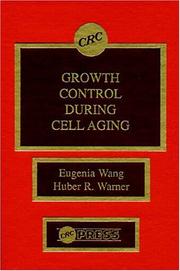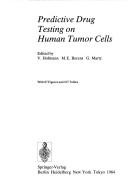| Listing 1 - 8 of 8 |
Sort by
|
Book
ISBN: 0471560901 Year: 1991 Publisher: New York Chichester Toronto Wiley-Liss
Abstract | Keywords | Export | Availability | Bookmark
 Loading...
Loading...Choose an application
- Reference Manager
- EndNote
- RefWorks (Direct export to RefWorks)
Cell cycle --- Cells - Growth - Regulation. --- Cancer cells - Growth - Regulation. --- Cell cycle. --- Pardee, Arthur Beck, 1921-

Abstract | Keywords | Export | Availability | Bookmark
 Loading...
Loading...Choose an application
- Reference Manager
- EndNote
- RefWorks (Direct export to RefWorks)
Cell proliferation --- Cells - Growth - Regulation. --- Cell proliferation. --- Cells - Aging.
Book
ISBN: 0120853604 1299193498 0323152732 9780120853601 Year: 1991 Publisher: San Diego, Calif. Academic Press
Abstract | Keywords | Export | Availability | Bookmark
 Loading...
Loading...Choose an application
- Reference Manager
- EndNote
- RefWorks (Direct export to RefWorks)
Histology. Cytology --- Molecular biology --- General embryology. Developmental biology --- Autocrine mechanisms --- Cells --- Paracrine mechanisms --- Growth factors --- Growth --- Regulation --- Autocrine mechanisms. --- Growth factors. --- Paracrine mechanisms. --- Regulation. --- Cells - Growth - Regulation
Book
ISBN: 0879694041 9780879694043 Year: 1991 Publisher: Plainview, N.Y. Cold Spring Harbor Laboratory Press
Abstract | Keywords | Export | Availability | Bookmark
 Loading...
Loading...Choose an application
- Reference Manager
- EndNote
- RefWorks (Direct export to RefWorks)
Carcinogens --- Neoplasms --- Oncogenes --- Cancer cells --- Carcinogenesis --- Cancérogenèse --- Congresses --- epidemiology --- congresses --- Etiology --- Growth --- Regulation --- Congrès --- Cancérogenèse --- Congrès --- congresses. --- Congresses. --- Carcinogenesis - Congresses. --- Oncogenes - Congresses. --- Cancer cells - Growth - Regulation - Congresses. --- Carcinogenesis - Congresses --- Oncogenes - Congresses --- Cancer cells - Growth - Regulation - Congresses --- Carcinogens - congresses --- Neoplasms - epidemiology - congresses --- Neoplasms - Etiology - Congresses --- Oncogenes - congresses

ISBN: 3540134972 0387134972 3642822975 3642822959 Year: 1984 Volume: vol 94 Publisher: Berlin : Springer-Verlag,
Abstract | Keywords | Export | Availability | Bookmark
 Loading...
Loading...Choose an application
- Reference Manager
- EndNote
- RefWorks (Direct export to RefWorks)
Oncology. Neoplasms --- Pharmacology. Therapy --- Kankercellen. Groei. --- Antineoplastische middelen --- Cancer. Chimiothérapie. --- Cellules cancéreuses. Croissance. --- Antinéoplastiques. --- Antineoplastic agents - Testing. --- Cancer cells - Growth - Regulation. --- Cloning. --- Cancer - Chemotherapy - Evaluation. --- Antineoplastic Agents - pharmacodynamics. --- Colony-Forming Units Assay. --- Neoplasms - drug therapy. --- Tumor Stem Cell Assay. --- Kanker. Chemotherapie. --- ANTINEOPLASTIC AGENTS --- COLONY-FORMING UNITS ASSAY --- DRUG SCREENING --- TOXICITY --- CONGRESSES --- METHODS
Book
ISBN: 1489983562 1441910743 144191076X 9786612830716 1441910751 1282830716 Year: 2010 Publisher: New York : Springer,
Abstract | Keywords | Export | Availability | Bookmark
 Loading...
Loading...Choose an application
- Reference Manager
- EndNote
- RefWorks (Direct export to RefWorks)
Leonard Hayflick and colleagues coined the term "cellular senescence" to describe the inevitable and irreversible proliferation arrest of primary human cells in culture. Specifically, Hayflick and coworkers reported the phenomenon of replicative senescence in primary human fibroblasts, showing that these cells can proliferate in vitro for about 55 population doublings before their proliferative capacity succumbs to irreversible proliferation arrest. Since those original observations, major advances in our understanding have come in several areas. We now know that several other triggers, in addition to proliferative exhaustion, can trigger the senescence program. One important class of senescence triggers, and a focus of this volume, are activated oncogenes in primary untransformed cells. There is now good evidence to indicate that senescence in response to this cue is a potent tumor suppressor mechanism, through its ability to block proliferation of incipient cancer cells. However, senescence is not simply a passive proliferation arrest that impacts only the senescent cell itself, but rather, senescent cells influence their environment and neighboring cells through an active secretory program. This secretory program appears to facilitate senescence as a tumor suppression process. Cellular Senescence and Tumor Suppression collects a number of chapters from leaders in the field to review the molecular basis of senescence and its physiological functions, with a particular emphasis on the role of senescence in tumor suppression.
Cancer cells - Growth - Regulation. --- Cancer cells --- Diseases --- Cell Physiological Processes --- Cell Aging --- Neoplasms --- Cell Physiological Phenomena --- Phenomena and Processes --- Medicine --- Oncology --- Health & Biological Sciences --- Growth --- Regulation --- Pathology, Cellular. --- Regulation. --- Cellular pathology --- Cytopathology --- Regulation of cancer cell growth --- Medicine. --- Cancer research. --- Human genetics. --- Pharmacology. --- Biomedicine. --- Cancer Research. --- Human Genetics. --- Pharmacology/Toxicology. --- Pathology --- Cytodiagnosis --- Biological control systems --- Cellular control mechanisms --- Oncology. --- Toxicology. --- Chemicals --- Pharmacology --- Poisoning --- Poisons --- Genetics --- Heredity, Human --- Human biology --- Physical anthropology --- Tumors --- Toxicology --- Drug effects --- Medical pharmacology --- Medical sciences --- Chemotherapy --- Drugs --- Pharmacy --- Cancer research --- Physiological effect

ISBN: 0897660498 9780897660495 Year: 1980 Volume: 339 Publisher: New York (N.Y.) New York academy of sciences
Abstract | Keywords | Export | Availability | Bookmark
 Loading...
Loading...Choose an application
- Reference Manager
- EndNote
- RefWorks (Direct export to RefWorks)
Histology. Cytology --- Cells --- Growth regulators --- Ion flow dynamics --- Growth --- Regulation --- Congresses --- Cell Differentiation. --- Cell Division. --- Cell Membrane. --- Ions. --- 57.017.64 --- 577.352.465 --- -Growth regulators --- -Ion flow dynamics --- -#WPLT:dd.prof.J.Vendrig --- Ionic flows --- Electrodynamics --- Growth regulating substances --- Organisms --- Cytology --- Cytoplasmic Membrane --- Plasma Membrane --- Cell Membranes --- Cytoplasmic Membranes --- Membrane, Cell --- Membrane, Cytoplasmic --- Membrane, Plasma --- Membranes, Cell --- Membranes, Cytoplasmic --- Membranes, Plasma --- Plasma Membranes --- Membranes --- Cell Division Phase --- Cell Divisions --- M Phase --- Division Phase, Cell --- Division, Cell --- Divisions, Cell --- M Phases --- Phase, Cell Division --- Phase, M --- Phases, M --- Cleavage Stage, Ovum --- Differentiation, Cell --- Cell Differentiations --- Differentiations, Cell --- Embryo, Mammalian --- Gene Expression Regulation --- Cell Lineage --- Growth. Development. --- Ion transport --- -Regulation --- -Congresses --- 577.352.465 Ion transport --- 57.017.64 Growth. Development. --- Cell Differentiation --- Cell Division --- Cell Membrane --- Ions --- #WPLT:dd.prof.J.Vendrig --- Growth&delete& --- Regulation&delete& --- Growth. Development --- Cells - Growth - Regulation - Congresses --- Growth regulators - Congresses --- Ion flow dynamics - Congresses
Book
ISBN: 1607611775 9786612824708 1607611783 1282824708 Year: 2009 Publisher: Totowa, N.J. ; London : Humana,
Abstract | Keywords | Export | Availability | Bookmark
 Loading...
Loading...Choose an application
- Reference Manager
- EndNote
- RefWorks (Direct export to RefWorks)
There is no question that loss of cell cycle checkpoint regulation is an intrinsic characteristic of cancer. However, many tumors retain parallel checkpoint pathways that are activated by antitumor agents and facilitate therapeutic response. Failures in these therapy-linked checkpoint controls are closely associated with cancers that are highly resistant to therapeutic interventions. Checkpoint Controls and Targets in Cancer provides present-day mechanistic understandings of how multiple sets of proteins orchestrate cell cycle progression, discusses critical checkpoint controls that are evaded for cancer development, focuses on checkpoint pathways associated with antitumor effects, and identifies specific checkpoint regulators for targeting with small molecules in the clinical management of cancer. These aspects of cell cycle checkpoints are articulated critically by renowned experts from both academia and industry, and new concepts are forwarded that challenge existing dogmas. Collectively, Checkpoint Controls and Targets in Cancer provides a unique collection of insightful contributions, which are timely and offer significant interest and appeal to basic, translational and clinical scientists.
Antineoplastic agents -- Development. --- Cancer cells -- Growth -- Regulation. --- Cellular control mechanisms. --- Drug Resistance, Neoplasm --- Cell Cycle --- Pharmacology --- Cell Cycle Proteins --- Antineoplastic Agents --- Neoplasms --- Drug Therapy --- Proteins --- Biological Science Disciplines --- Therapeutics --- Cell Physiological Processes --- Diseases --- Therapeutic Uses --- Drug Resistance --- Amino Acids, Peptides, and Proteins --- Pharmacologic Actions --- Pharmacological Phenomena --- Analytical, Diagnostic and Therapeutic Techniques and Equipment --- Natural Science Disciplines --- Cell Physiological Phenomena --- Physiological Phenomena --- Chemicals and Drugs --- Disciplines and Occupations --- Phenomena and Processes --- Chemical Actions and Uses --- Oncology --- Public Health - General --- Animal Biochemistry --- Human Anatomy & Physiology --- Public Health --- Medicine --- Health & Biological Sciences --- Antineoplastic agents --- Cancer cells --- Development. --- Growth --- Regulation. --- Cell regulation --- Regulation of cancer cell growth --- Medicine. --- Cancer research. --- Pharmacology. --- Oncology. --- Biomedicine. --- Cancer Research. --- Pharmacology/Toxicology. --- Tumors --- Drug effects --- Medical pharmacology --- Medical sciences --- Chemicals --- Chemotherapy --- Drugs --- Pharmacy --- Cancer research --- Clinical sciences --- Medical profession --- Human biology --- Life sciences --- Pathology --- Physicians --- Physiological effect --- Biological control systems --- Cell metabolism --- Cellular control mechanisms
| Listing 1 - 8 of 8 |
Sort by
|

 Search
Search Feedback
Feedback About UniCat
About UniCat  Help
Help News
News